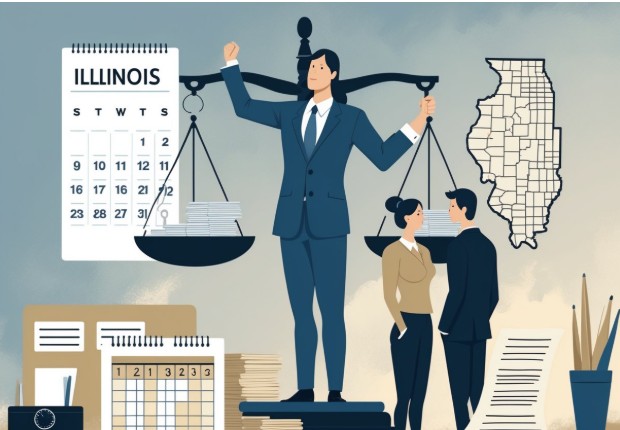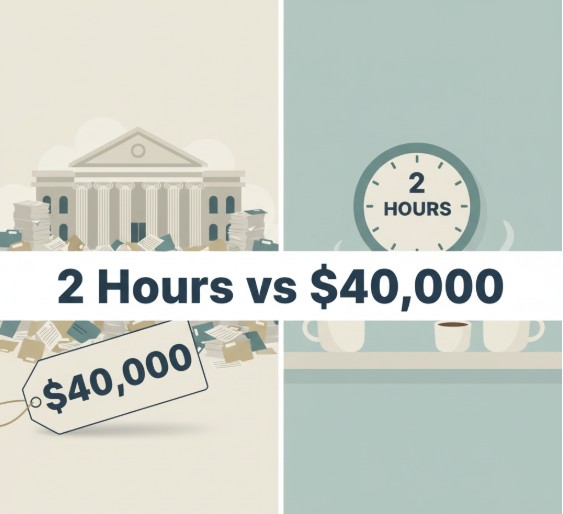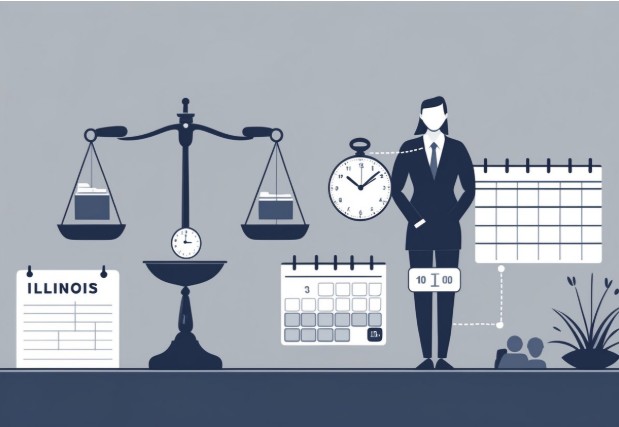Going through a divorce is never easy. Sometimes, people in Illinois actually choose to delay filing on purpose.
Intentional delays can help with financial planning, emotional preparation, or timing around children’s needs.
However, those delays can backfire—costs increase, legal headaches multiply, and emotional stress persists longer than anyone wants it to.
Divorce delays can occur for various reasons, and not all of them are detrimental. Some spouses need time to gather important papers or save money for legal fees.
Others want to wait until after a child’s graduation or until they feel emotionally ready for the process. However, waiting too long can create new problems.
Delaying divorce proceedings can lead to financial damage and an emotional toll that makes the situation worse over time.
Key Takeaways
- Strategic delays for financial preparation or emotional readiness can be helpful, but extended delays often increase costs and stress.
- Alternative approaches, such as mediation, can reduce the need for lengthy delays while protecting the interests of both parties.
- Delays become harmful when they involve safety risks, deliberate obstruction, or prevent necessary legal protections from taking effect.
Why Would Someone Delay Filing For Divorce On Purpose?

People often delay the divorce process for various reasons. Some are practical, others are deeply emotional.
Emotional reasons often drive these decisions. Some spouses refuse to accept that the marriage is ending and hope their partner will change their mind.
They may not feel ready emotionally to face the reality of divorce. Financial considerations play a major role in timing decisions.
Some folks worry about the costs of divorce or want to stay on their spouse’s health insurance. Others might be playing financial games to run up attorney fees or force a better settlement.
Children’s well-being concerns many parents. They think waiting is better for the kids and want to time the divorce around school schedules or important events.
Spite or punishment motivates some delay tactics. An angry spouse might drag out the process to cause frustration or emotional pain to their partner.
Practical matters can also cause delays. Some people just hate paperwork and legal hassles.
Others want to complete important life events, such as graduations or job changes, first. Sometimes, people need more time to consider their decisions and whether they want to try to save their marriage.
This gives them space to consider all their options carefully.
Reason #1 — Financial Preparation

Getting your finances ready before a divorce can save you a lot of trouble later. Taking a few steps now gives you a clearer picture of your money and helps you avoid mistakes.
Do Now
Gather all financial documents right away. Grab bank statements, tax returns, investment accounts, and retirement plans from the last three years.
Make copies and stash them somewhere safe—just in case. Open your own bank account in your name only.
Start moving small amounts of your income into this account on a regular basis. This ensures you have access to funds during the divorce process.
Document all assets and debts by making a detailed list. Include:
- House value and mortgage balance
- Car values and loan amounts
- Credit card balances
- Investment account balances
- Business ownership interests
Track monthly expenses for at least three months. Write down everything—mortgage payments, groceries, you name it.
This helps you determine how much you need to live independently. Spouses can protect themselves from financial hardship, or at least try to minimize the impact of starting a divorce process by preparing early.
Reason #2 — Child-Centered Timing
Parents might delay divorce to shield their children from emotional pain or to wait for a better moment in their lives. But delaying divorce for the kids could do more harm than good in many cases.
Do Now
Take action if staying together creates a toxic home for your kids. Constant conflict at home can damage a child’s emotional growth more than divorce itself.
Signs it’s time to move forward:
- Daily arguments in front of children
- Children asking about their parents’ relationship problems
- Kids showing stress symptoms like changes in sleep or grades
- Physical harm to the children
- Physical harm to you
Child custody and support issues can make divorce more complex and take longer. But waiting around usually makes things messier.
Children need stability and honest communication. When parents delay divorce but keep fighting, kids learn that unhealthy relationships are normal.
Better approaches include:
- Filing for divorce while focusing on co-parenting
- Getting counseling for the family during the process
- Creating consistent routines across two homes
Reason #3 — Emotional Readiness
Some people put off divorce because they’re just not ready to handle the emotions that come with ending a marriage.
But you can take steps now to build up your emotional strength and move forward when the time feels right.
Do Now
Start therapy or counseling immediately. A mental health professional helps you work through anger, sadness, and fear.
Join a divorce support group. Talking to others who’ve been there makes the process less lonely and gives you real-life advice.
Create daily emotional habits. Try journaling for 10 minutes in the morning, some deep breathing, or a short walk to clear your head.
Set small, achievable goals. Instead of stressing about the whole divorce, break it down—maybe start with gathering financial documents or just meet with one attorney.
Build a support network. Pick three friends or family members who can be there for you when things get rough.
Thinking of a short pause before filing? Anna K Law offers Collaborative Divorce to replace delay with private, steady progress. Contact us to schedule your consultation today.
Risk Screen: Signs A Delay Is Unsafe Or Harmful
Some divorce delays are normal, but certain warning signs show when stalling becomes dangerous.
Identifying these red flags early can help protect your safety, finances, and mental well-being during the divorce process.
Physical safety concerns need immediate attention if a spouse delays divorce. Threats or abuse often escalate during separation.
Financial manipulation is a big risk if one spouse controls access to money or accounts. Watch for hidden assets or sudden changes in finances.
Emotional abuse through the legal system happens when someone uses delay tactics to wear down their partner. This might mean switching lawyers a lot or skipping court dates.
Child safety issues pop up when delays affect custody. Using kids as pawns or blocking access causes real harm.
Mental health decline shows up when uncertainty drags on—think anxiety, depression, or panic attacks. Seek professional help if daily life becomes overwhelming.
Housing instability can happen if delays stop fair property division. One spouse may end up without a safe place to live while waiting for things to be resolved.
Private Paths That Reduce The Need To Delay (Mediation & Collaborative Divorce)
Mediation and collaborative divorce allow couples to control the timing and outcomes without the court’s involvement.
These private options provide families with more flexibility to work through tough issues at their own pace, avoiding the drama of public litigation.
Mediation Benefits:
- Faster resolution – Most cases are resolved within 4-6 months, although results vary and each couple’s progress depends on how quickly they are able to reach settlement agreements in mediation.. That’s a huge difference from the 12+ months you’d probably spend in court.
- Lower costs – Mediation usually runs $3,000-$7,000, while litigation can easily top $15,000.
- Privacy protection – Everything you discuss stays confidential.
- Flexible scheduling – You can schedule sessions around your family or work commitments. No strict court calendars breathing down your neck.
Collaborative Divorce Advantages:
- Team approach – similar benefits to mediation with the added support of the team made up of collaborative attorneys, financial neutral, a coach, and/or possibly a child specialist if needed.
- Customized solutions – The process allows you to tailor outcomes to fit your family’s specific needs.
- Open communication – Talking things out tends to lower conflict and emotional stress.
- Court avoidance – You keep your personal life out of the public record.
Key Differences:
| Process |
Professional Support |
Cost Range |
Timeline |
| Mediation |
Neutral mediator (but you will still need at least one attorney to create all the legal documents, possibly two attorneys if you each wish to be represented by an attorney in finalizing your divorce) |
$3,000-$7,000+ |
4-6 months+ |
| Collaborative |
Full collaborative team possibly made up of collaborative attorneys (who will assist in negotiating the agreement and finalizing the divorce documents and obtaining divorce judgment), financial neutral to help assess and explain financial documents and options and coach or child specialist to help with parenting decisions and processing emotions. |
$8,000-$15,000+ |
3-8 months+ |
Both approaches help couples move forward without prolonging the process. You get a clear structure, but still keep control over the big family decisions.
Documents To Prepare Before Serving Papers
Getting your paperwork together early helps you avoid delays. If you have these documents ready before your lawyer files, it before you begin mediation or collaborative process, you’ll probably move through the process a lot faster.
Essential Financial Documents:
- Tax returns for the last three years
- Bank statements from all accounts (checking, savings, investments)
- Pay stubs and job records
- Credit card statements and info on debts
- Mortgage statements and property deeds
- Retirement account statements (401k, IRA, pension)
Personal Information Records:
- Marriage certificate
- Birth certificates for your kids
- Social Security cards for everyone in the family
- Insurance policies (health, life, auto, home)
Legal Preparation Items:
- List of assets with estimated values
- Any prenuptial or postnuptial agreements
- Records of domestic violence, if relevant
Having these records will simplify your process and your conversations with your attorney. With complete financial records, it’s much easier to sort out property and support issues. If you’re missing documents, it can slow things down when you try to serve divorce papers. Courts want detailed financial information to divide assets and set support fairly.
On the other hand sometimes you need to speak with an attorney before you have all these records ready. It’s okay to contact Anna K for an initial consultation to discuss your options where you are in your divorce journey. We can figure it out together. Click here to schedule a consultation with Anna.
How Long Is Too Long To Delay?
If the pause lacks milestones—or risk, conflict, or uncertainty grows—the delay is no longer strategic.
Use a 30–90-day window with checkpoints, transitioning to mediation, collaborative sessions, or court protections if conditions don’t improve.
Illinois has a mandatory 6-month waiting period before you can finalize any divorce. It’s meant to give couples a chance to work through issues or even reconcile, although that’s not always realistic.
Contested divorces can drag on for 6 months to 2 years, or longer, depending on the court’s schedule and how complicated things get—waiting 30 days just to file an appearance? Courts usually won’t call that unreasonable.
Reconciliation periods can last up to one year, but some judges limit them to six months. Once that window closes, the court expects progress.
Financial and emotional costs add up quickly as delays stretch out. The longer you wait, the more damage piles up—not just to your bank account, but to your mental health too.
Judges lose patience with obvious stall tactics after the required waiting periods end. If someone consistently delays without a valid reason, the court may impose sanctions or even a default judgment.
When delay starts to feel risky, clarity matters. Anna K Law can open a focused Legal Consultation to assess safety, finances, and next steps. Contact us to schedule now.
Frequently Asked Questions
Is it ever a good idea to delay filing for divorce?
Yes—if the pause is structured. Short delays allow couples to organize their finances, support their children during transitions, or gain emotional clarity. The key is setting milestones and deadlines. Open-ended stalling usually increases stress, costs, and the risk of hidden assets or unsafe situations.
What financial steps can I take if I delay the divorce?
Gather tax returns, pay stubs, and statements for bank, retirement, and credit accounts. Draft a pre- and post-divorce budget and identify assets that require valuation. Map health insurance options before filing. A deadline ensures preparation, not avoidance.
Can delaying divorce benefit my children?
Sometimes. Waiting until after a grading period, a therapy milestone, or the holidays can ease transitions. Still, living in prolonged conflict often harms children more than behinning the divorce process. Structure the pause around routines, parenting plans, and predictable schedules. Ultimately, only you can decide if a divorce us right for you and your family and when to start that process.
How long is too long to delay a divorce?
Most professionals suggest 30–90 days. Beyond that, unless there’s a clear purpose and progress, the delay may cause more harm than good. If milestones slip, conflict escalates, or safety risks emerge, proceed with mediation, collaboration, or litigation in court.
What if my spouse is using a delay to hide money or stall the proceedings?
That’s a red flag. Preserve records, talk to your attorney, and consider court-ordered discovery or temporary financial orders. Continuing to wait in the face of dishonesty usually weakens your position.
Can mediation or collaborative divorce process start before we file for divorce?
Yes. Many couples negotiate through mediation or collaborative divorce process first, then file an uncontested case to finalize the agreement. This approach provides structure, privacy, and momentum, eliminating the need for unnecessary delays. It also keeps your costs lower.














